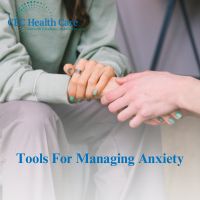Psychological & Psychiatric Services
 Psychological services are available at CEC Health Care. A psychological overview is beneficial in understanding your strengths and challenges. The psychological assessment process allows for diagnostic clarity in how to help you.
Psychological services are available at CEC Health Care. A psychological overview is beneficial in understanding your strengths and challenges. The psychological assessment process allows for diagnostic clarity in how to help you.
Psychological services are offered in our Seaford and Bethpage Health Center and via Telehealth.
Psychiatric Services are available at our Seaford, Bethpage, Glen Cove and Hauppauge health centers and via Telehealth.
For more information or to make an appointment contact us at (516) 622-8888
Tackling Anxiety: How to Manage Your Stress
Anxiety is a common mental health challenge that can affect anyone, regardless of age or background. In today’s fast-paced world, managing anxiety and stress is crucial for maintaining overall well-being. While anxiety can be overwhelming, it’s important to remember that there are effective strategies to help you regain control. If you’re struggling, seeking help from a psychiatrist in Seaford that accepts Medicaid can be a valuable step. Below, we explore practical ways to tackle anxiety and manage stress. CEC Health Center can help!
-
Understand Your Triggers
Anxiety often stems from specific triggers, which can vary from person to person. These triggers might include work pressure, financial worries, health concerns, or personal relationships. The first step in managing anxiety is to identify these triggers. Keeping a journal to note when you feel anxious and what might have caused it can be an effective way to pinpoint your stressors. Once you understand your triggers, you can begin to develop strategies to address them. Visit our website to learn more!
-
Practice Relaxation Techniques
Relaxation techniques are essential tools in managing anxiety. These techniques help calm your mind and body, reducing the physical and emotional symptoms of anxiety. Some effective relaxation techniques include:
- Deep Breathing: Focus on taking slow, deep breaths to reduce tension.
- Meditation: Practicing mindfulness meditation can help you stay grounded in the present moment.

- Progressive Muscle Relaxation: Tensing and then slowly releasing different muscle groups can ease physical stress.
Incorporating these techniques into your daily routine can make a significant difference in managing anxiety.
-
Stay Physically Active
Regular physical activity is not only beneficial for your physical health but also plays a crucial role in managing anxiety. Exercise releases endorphins, which are natural mood lifters. Engaging in activities like walking, jogging, swimming, or yoga can help reduce stress levels and improve your overall mood. Aim to include at least 30 minutes of physical activity in your day. Even small activities like stretching or taking a walk can help alleviate anxiety. Contact our office today!
-
Connect with a Professional
When anxiety feels unmanageable, seeking professional help is a vital step. A psychiatrist in Seaford that accepts Medicaid can provide personalized support, including therapy and, if necessary, medication management. Psychiatrists are trained to help individuals understand their anxiety and develop coping strategies tailored to their specific needs. Whether you’re dealing with generalized anxiety disorder, panic attacks, or situational stress, professional guidance can make a substantial difference in your mental health journey.
-
Build a Support Network
Social support is a key factor in managing anxiety. Having a network of supportive friends, family members, or even a support group can provide comfort and encouragement. Talking about your feelings with someone you trust can help you process your emotions and gain perspective. If you don’t feel comfortable sharing your experiences with friends or family, consider joining a support group where you can connect with others who understand what you’re going through.
-
Maintain a Healthy Lifestyle
Your lifestyle choices can significantly impact your anxiety levels. Ensuring that you get enough sleep, eat a balanced diet, and avoid substances like caffeine and alcohol can help stabilize your mood. Sleep is particularly important, as lack of rest can exacerbate anxiety symptoms. Aim for 7-9 hours of sleep per night and establish a bedtime routine to promote better sleep hygiene. Additionally, staying hydrated and nourishing your body with nutrient-rich foods can improve your resilience against stress.
Psychiatrist in Seaford That Accepts Medicaid
Managing anxiety is an ongoing process, but with the right strategies and support, it is possible to lead a fulfilling life. Understanding your triggers, practicing relaxation techniques, staying active, and seeking professional help are all important steps in this journey. If you’re struggling with anxiety, remember that you don’t have to face it alone. Consulting a psychiatrist in Seaford that accepts Medicaid can provide you with the tools and resources needed to manage your anxiety effectively and regain control of your life. Visit our website today!
Understanding The Relationship Between Anxiety & Depression
Anxiety and depression often coexist, creating a complex relationship that can significantly impact one’s mental health. Understanding how these conditions intertwine is crucial for effective management. If you’re struggling with both, consulting a psychiatrist in Seaford that accepts Medicaid can provide the support you need.
-
The Overlap Between Anxiety and Depression
Anxiety and depression share many symptoms, such as fatigue, irritability, and difficulty concentrating. This overlap can make it challenging to distinguish between the two. People with anxiety may experience persistent worry and fear, while those with depression often feel overwhelming sadness and hopelessness. When these conditions occur together, the symptoms can intensify, leading to a more severe mental health crisis.
-
How They Feed Into Each Other
Anxiety and depression can create a vicious cycle. For example, someone with anxiety may worry excessively about the future, leading to feelings of despair and hopelessness—hallmarks of depression. Conversely, a person with depression might feel unmotivated, which can increase anxiety about their responsibilities and social interactions. This cycle can be difficult to break without professional help.
- Common Symptoms of Co-occurring Anxiety and Depression
- Restlessness and agitation
- Chronic fatigue and sleep disturbances
- Difficulty concentrating
- Irritability or anger
- Physical symptoms, such as headaches or digestive issues
These symptoms can be overwhelming, but recognizing them is the first step toward getting help.
-
Seeking Professional Help
If you’re experiencing symptoms of both anxiety and depression, it’s essential to seek professional help. A psychiatrist in Seaford that accepts Medicaid can assess your condition, provide a diagnosis, and recommend a treatment plan tailored to your needs. Treatment often includes a combination of therapy and medication to address both conditions simultaneously. CEC Health Center will provide you with a tailored treatment plan!
Treatment Approaches
- Cognitive Behavioral Therapy (CBT): This type of therapy helps individuals identify and change negative thought patterns that contribute to anxiety and depression.
- Medication: Antidepressants and anti-anxiety medications can help regulate mood and reduce symptoms.
- Lifestyle Changes: Incorporating regular exercise, a healthy diet, and stress management techniques can improve your overall well-being.
CEC Health Center
The relationship between anxiety and depression is complex, but with the right support, it’s possible to manage both conditions effectively. Understanding how they interact and seeking help from a psychiatrist in Seaford that accepts Medicaid can lead to a more balanced and fulfilling life. Don’t hesitate to reach out for the help you need—you deserve to feel better.
